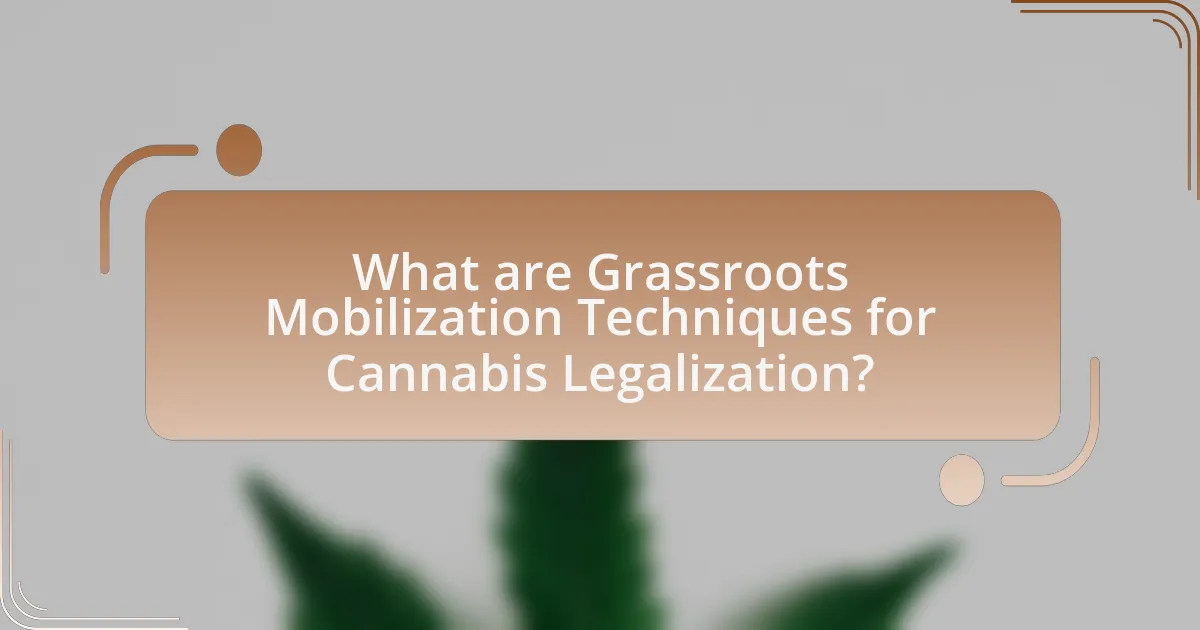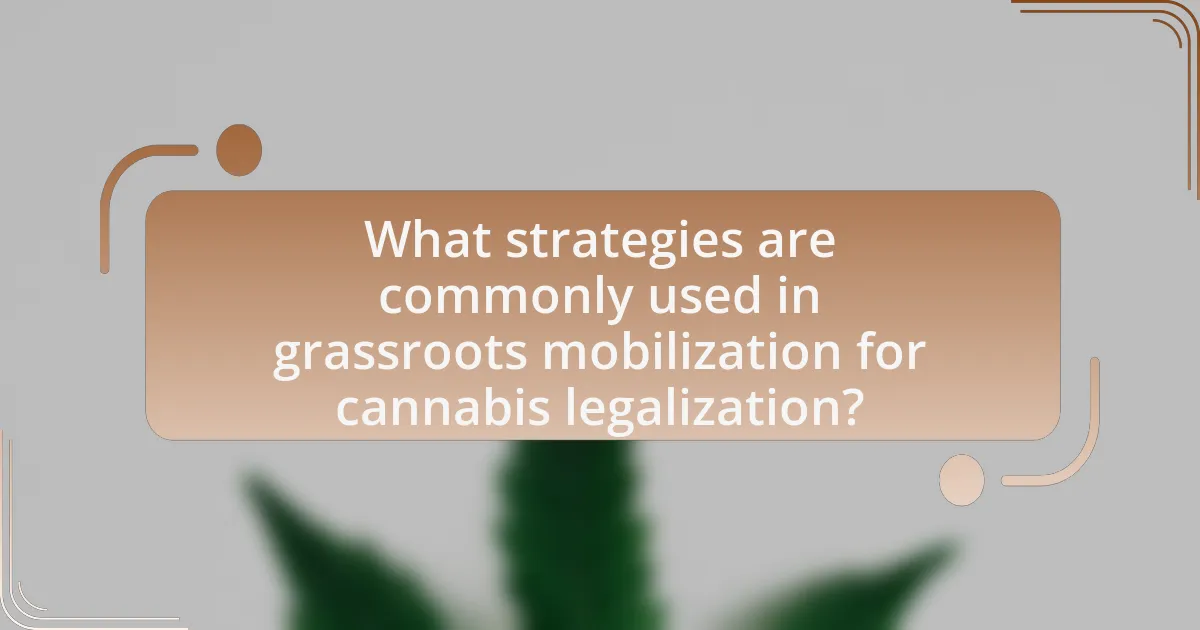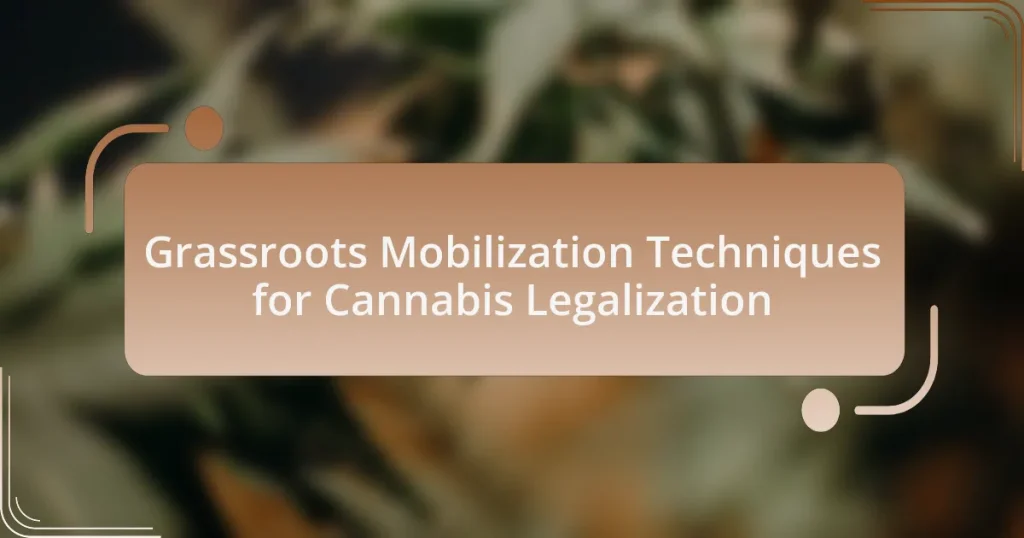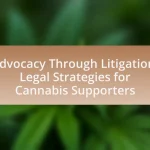Grassroots mobilization techniques for cannabis legalization encompass community organizing, advocacy campaigns, and coalition building, which are essential for fostering public support and influencing policy changes. These techniques engage local residents through educational events, social media outreach, and public demonstrations, as evidenced by successful legalization efforts in states like Colorado and California. Key principles include community engagement, collective action, and empowerment, which drive local initiatives to inform the public about the benefits of legalization while countering misinformation. The article also addresses the challenges faced by grassroots movements, such as funding limitations and regulatory hurdles, and highlights best practices for effective mobilization, including volunteer training and coalition formation.

What are Grassroots Mobilization Techniques for Cannabis Legalization?
Grassroots mobilization techniques for cannabis legalization include community organizing, advocacy campaigns, and coalition building. Community organizing involves engaging local residents to raise awareness and support for legalization efforts, often through town hall meetings and educational events. Advocacy campaigns utilize social media, petitions, and public demonstrations to influence public opinion and policymakers. Coalition building brings together various stakeholders, such as health professionals, civil rights organizations, and local businesses, to create a united front that amplifies the call for legalization. These techniques have been effective in various states, as seen in the successful legalization efforts in Colorado and California, where grassroots movements played a crucial role in shaping public policy.
How do grassroots mobilization techniques contribute to cannabis legalization efforts?
Grassroots mobilization techniques significantly contribute to cannabis legalization efforts by fostering community engagement and building a broad base of support. These techniques, such as organizing local events, leveraging social media campaigns, and facilitating direct communication with lawmakers, empower individuals to advocate for policy changes. For instance, the successful legalization of cannabis in states like Colorado and California can be attributed to grassroots movements that effectively mobilized citizens to participate in initiatives and referendums, demonstrating the power of collective action. Additionally, research indicates that grassroots campaigns can increase voter turnout and influence public opinion, which are critical factors in the legislative process surrounding cannabis legalization.
What are the key principles behind grassroots mobilization?
The key principles behind grassroots mobilization include community engagement, collective action, and empowerment. Community engagement involves actively involving local individuals in the decision-making process, ensuring their voices are heard and valued. Collective action emphasizes the importance of uniting individuals around a common goal, fostering solidarity and shared purpose. Empowerment focuses on equipping community members with the knowledge and resources necessary to advocate for their interests effectively. These principles are supported by successful grassroots movements, such as the campaign for cannabis legalization, which demonstrated that mobilizing local support can lead to significant policy changes.
How do these principles apply specifically to cannabis legalization?
The principles of grassroots mobilization apply to cannabis legalization by emphasizing community engagement, advocacy, and education. These principles drive local efforts to inform the public about the benefits of legalization, such as economic growth and social justice, while countering misinformation. For instance, successful campaigns in states like Colorado and California utilized grassroots strategies, including door-to-door canvassing and social media outreach, to build support and mobilize voters. Research shows that grassroots movements can significantly influence public opinion; a 2018 study by the Pew Research Center indicated that public support for cannabis legalization increased from 32% in 2000 to 62% in 2018, largely due to grassroots efforts.
Why is grassroots mobilization important in the context of cannabis legalization?
Grassroots mobilization is crucial in the context of cannabis legalization because it empowers local communities to advocate for policy changes that reflect their needs and values. This form of mobilization fosters public awareness and education about the benefits and implications of legalization, which can influence public opinion and legislative action. For instance, successful grassroots campaigns in states like Colorado and Washington have demonstrated that organized community efforts can lead to significant shifts in policy, resulting in the legalization of cannabis for recreational use. These campaigns often utilize strategies such as community meetings, social media outreach, and coalition-building to engage diverse stakeholders, thereby amplifying their impact and ensuring that the voices of those directly affected by cannabis laws are heard.
What role does community engagement play in mobilization efforts?
Community engagement is crucial in mobilization efforts as it fosters a sense of ownership and collective action among individuals. Engaging the community allows for the identification of shared goals and concerns, which enhances the effectiveness of mobilization strategies. For instance, research by the Center for Community Change highlights that grassroots movements, particularly in cannabis legalization, have successfully utilized community engagement to build coalitions, increase awareness, and drive policy changes. This involvement not only amplifies voices but also creates a network of support that is essential for sustained mobilization efforts.
How does grassroots mobilization influence public opinion on cannabis legalization?
Grassroots mobilization significantly influences public opinion on cannabis legalization by fostering community engagement and raising awareness about the benefits of legalization. Through organized campaigns, local advocacy groups effectively disseminate information, challenge misconceptions, and create a narrative that resonates with the public. For instance, a study by the Pew Research Center in 2021 indicated that states with active grassroots movements saw a 20% increase in public support for cannabis legalization compared to those without such initiatives. This demonstrates that grassroots efforts can shift perceptions and encourage broader acceptance of cannabis policies.

What strategies are commonly used in grassroots mobilization for cannabis legalization?
Common strategies used in grassroots mobilization for cannabis legalization include community organizing, coalition building, and public education campaigns. Community organizing involves mobilizing local supporters to engage in advocacy efforts, such as attending town hall meetings and participating in rallies. Coalition building focuses on forming alliances with various stakeholders, including health organizations, civil rights groups, and local businesses, to create a unified front for legalization efforts. Public education campaigns aim to inform the public about the benefits of cannabis legalization, utilizing social media, informational pamphlets, and community events to disseminate accurate information and counteract stigma. These strategies have been effective in various states, as evidenced by successful legalization initiatives in places like Colorado and California, where grassroots efforts played a crucial role in shaping public opinion and influencing legislative outcomes.
How can social media be leveraged for grassroots mobilization?
Social media can be leveraged for grassroots mobilization by facilitating rapid information dissemination, community engagement, and mobilizing supporters for cannabis legalization initiatives. Platforms like Facebook, Twitter, and Instagram allow organizations to share updates, organize events, and create campaigns that resonate with local communities. For instance, the 2016 campaign for cannabis legalization in California utilized social media to reach millions, resulting in significant voter turnout and support. According to a study by the Pew Research Center, 69% of adults in the U.S. use social media, making it a powerful tool for grassroots movements to connect with a broad audience and encourage participation in advocacy efforts.
What platforms are most effective for cannabis advocacy?
Social media platforms, particularly Facebook, Twitter, and Instagram, are the most effective for cannabis advocacy. These platforms allow advocates to reach a broad audience, engage with supporters, and share information rapidly. For instance, Facebook groups dedicated to cannabis legalization have successfully mobilized thousands of members to participate in local events and campaigns. Additionally, Twitter’s real-time communication enables advocates to respond quickly to legislative developments and organize grassroots actions. Instagram’s visual content can effectively highlight personal stories and experiences related to cannabis use, fostering community support. These platforms collectively enhance visibility and facilitate grassroots mobilization efforts essential for cannabis legalization.
How can messaging be tailored for different audiences on social media?
Messaging can be tailored for different audiences on social media by segmenting the audience based on demographics, interests, and behaviors. For instance, younger audiences may respond better to informal language and visual content, while older demographics might prefer more detailed information and formal communication. Research indicates that 70% of millennials engage with brands that use humor in their messaging, highlighting the importance of adapting tone and style to resonate with specific groups. Additionally, utilizing targeted ads and analytics tools allows organizations to refine their messaging strategies, ensuring that content aligns with the values and preferences of each audience segment.
What are the benefits of organizing local events for cannabis legalization?
Organizing local events for cannabis legalization fosters community engagement and raises awareness about the benefits of legalization. These events create a platform for education, allowing participants to learn about the legal, medical, and economic advantages of cannabis. For instance, studies have shown that states with active grassroots campaigns, including local events, have seen increased public support for legalization, leading to successful legislative changes. Additionally, local events can mobilize voters, as evidenced by the 2016 California Proposition 64 campaign, where community gatherings significantly contributed to the measure’s passage, highlighting the effectiveness of grassroots mobilization in influencing public policy.
How do local events foster community support?
Local events foster community support by creating opportunities for individuals to connect, collaborate, and engage with one another around shared interests and goals. These gatherings, such as festivals, workshops, or town hall meetings, encourage participation and dialogue, which strengthens social ties and builds a sense of belonging. Research indicates that communities with strong social networks are more likely to mobilize effectively for causes, including cannabis legalization, as they can share resources, information, and strategies. For example, a study published in the Journal of Community Psychology found that community events significantly increase civic engagement and collective efficacy, which are crucial for grassroots movements.
What types of events are most effective for mobilization?
Grassroots mobilization for cannabis legalization is most effective through community events, rallies, and educational workshops. Community events foster local engagement and create a sense of belonging, which is crucial for building a supportive network. Rallies serve as powerful visual demonstrations of support, often attracting media attention and raising public awareness. Educational workshops provide vital information about cannabis legalization, empowering individuals with knowledge that can motivate them to take action. Research indicates that events with interactive elements, such as Q&A sessions or hands-on activities, significantly increase participant engagement and retention of information, further enhancing mobilization efforts.

What challenges do grassroots mobilization efforts face in cannabis legalization?
Grassroots mobilization efforts in cannabis legalization face significant challenges, including limited funding, regulatory hurdles, and public perception issues. Limited funding restricts the ability of grassroots organizations to effectively campaign and reach a wider audience, as evidenced by a 2021 report from the National Organization for the Reform of Marijuana Laws, which highlighted that many grassroots initiatives operate on tight budgets. Regulatory hurdles, such as varying state laws and local ordinances, complicate the mobilization process, making it difficult for activists to unify their efforts across different jurisdictions. Additionally, public perception issues, including stigma surrounding cannabis use, can hinder outreach and support, as shown in a 2020 survey by the Pew Research Center, which indicated that while support for legalization is growing, significant portions of the population still hold negative views about cannabis. These factors collectively impede the effectiveness of grassroots mobilization in achieving cannabis legalization.
How can misinformation impact grassroots mobilization?
Misinformation can significantly hinder grassroots mobilization by creating confusion and distrust among potential supporters. When inaccurate information circulates, it can lead to misperceptions about the goals, benefits, and implications of cannabis legalization efforts. For instance, studies have shown that misinformation can decrease public support by framing legalization as a threat to community safety or health, which can deter individuals from participating in mobilization activities. Additionally, misinformation can fragment grassroots organizations, as differing beliefs about the validity of claims can cause internal conflicts and weaken collective action. This phenomenon was evident during various cannabis legalization campaigns, where misleading narratives about the effects of legalization influenced public opinion and participation rates.
What strategies can be employed to combat misinformation?
To combat misinformation, strategies such as fact-checking, public education campaigns, and leveraging social media platforms can be employed. Fact-checking organizations, like Snopes and FactCheck.org, provide verified information to counter false claims. Public education campaigns can raise awareness about cannabis legalization, using data from studies like the 2020 report by the National Academies of Sciences, Engineering, and Medicine, which highlights the benefits and risks of cannabis use. Additionally, social media platforms can implement algorithms to flag or reduce the visibility of misleading content, as seen in initiatives by Facebook and Twitter to address misinformation during elections. These strategies collectively enhance the accuracy of information disseminated to the public.
How can mobilizers ensure accurate information is disseminated?
Mobilizers can ensure accurate information is disseminated by verifying sources and utilizing trusted channels for communication. By cross-referencing information with reputable organizations, such as the National Organization for the Reform of Marijuana Laws (NORML), mobilizers can confirm the validity of the data they share. Additionally, employing platforms that prioritize fact-checking, like established news outlets or academic publications, further enhances the reliability of the information disseminated. This approach not only builds credibility but also fosters trust within the community, which is essential for effective grassroots mobilization in cannabis legalization efforts.
What legal and regulatory hurdles must be navigated in grassroots efforts?
Grassroots efforts for cannabis legalization must navigate several legal and regulatory hurdles, including compliance with local, state, and federal laws regarding cannabis use and distribution. These hurdles often involve understanding the specific regulations that govern cannabis advocacy, such as campaign finance laws that dictate how funds can be raised and spent, as well as restrictions on lobbying activities. Additionally, grassroots organizations must be aware of zoning laws that can affect where cannabis-related activities can take place, and they must also consider the legal implications of public demonstrations or protests, which may require permits. Failure to comply with these regulations can result in legal penalties, undermining the effectiveness of grassroots mobilization efforts.
How do local laws affect mobilization strategies?
Local laws significantly influence mobilization strategies by determining the legal framework within which advocacy efforts operate. For instance, jurisdictions with supportive cannabis legislation may encourage grassroots organizations to focus on community education and outreach, while areas with restrictive laws may necessitate more covert or defensive strategies to avoid legal repercussions. Research indicates that in states where cannabis is legalized, mobilization efforts often leverage local support networks and public forums to build momentum, as seen in California’s Proposition 64 campaign, which utilized local endorsements to enhance visibility and credibility. Conversely, in states with prohibitive laws, mobilization strategies may involve legal challenges or lobbying for policy reform, as evidenced by the efforts in states like Texas, where activists have had to navigate a complex legal landscape to advocate for change.
What resources are available to help navigate these challenges?
Resources available to help navigate challenges in grassroots mobilization for cannabis legalization include advocacy organizations, online platforms, and educational materials. Advocacy organizations such as the National Organization for the Reform of Marijuana Laws (NORML) provide guidance, networking opportunities, and legal resources. Online platforms like Change.org facilitate petitions and community engagement, allowing activists to rally support. Educational materials, including webinars and workshops offered by groups like the Marijuana Policy Project, equip individuals with knowledge on effective mobilization strategies and legal frameworks. These resources collectively empower grassroots efforts by providing essential tools and information for successful advocacy.
What are best practices for effective grassroots mobilization in cannabis legalization?
Effective grassroots mobilization in cannabis legalization involves building a strong community network, utilizing social media for outreach, and engaging in local advocacy efforts. Establishing a community network fosters collaboration among supporters, which can amplify voices and increase visibility. Social media platforms serve as powerful tools for disseminating information, organizing events, and rallying support, as evidenced by campaigns that have successfully used platforms like Facebook and Twitter to mobilize thousands of advocates. Local advocacy efforts, such as town hall meetings and partnerships with local organizations, create opportunities for direct engagement with policymakers and the public, enhancing the movement’s impact. These practices have been shown to significantly contribute to successful legalization initiatives in various states, demonstrating their effectiveness in grassroots mobilization.
How can coalitions be formed to strengthen mobilization efforts?
Coalitions can be formed to strengthen mobilization efforts by identifying common goals among diverse stakeholders and fostering collaboration through shared resources and strategies. Engaging local organizations, advocacy groups, and community leaders creates a unified front that amplifies voices and increases outreach. For example, the successful coalition-building efforts seen in the cannabis legalization movement often involve aligning interests of various groups, such as medical professionals, civil rights organizations, and economic advocates, which collectively enhance the effectiveness of mobilization campaigns. Research indicates that coalitions that leverage the strengths of their members can achieve greater impact, as evidenced by the National Organization for the Reform of Marijuana Laws (NORML), which has effectively mobilized grassroots support through coalition-building strategies.
What role does volunteer training play in successful mobilization?
Volunteer training is essential for successful mobilization as it equips individuals with the necessary skills and knowledge to effectively engage in grassroots efforts. Training enhances volunteers’ understanding of the campaign’s goals, strategies, and messaging, which is critical for coherent communication and action. For instance, a study by the National Council of Nonprofits highlights that well-trained volunteers are 50% more likely to contribute positively to campaign outcomes, demonstrating the direct impact of training on mobilization success.


